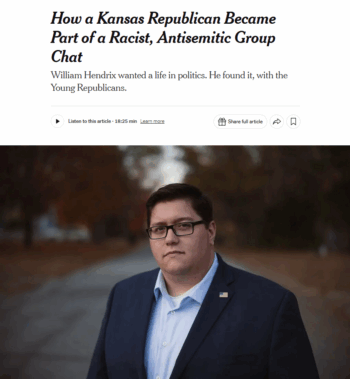
The New York Times headline (11/3/25) presents the racist group chat as something that happened to William Hendrix—as opposed to a group that was racist because its members were.
In the latest installment of sympathetic media profiles in the “Nazi Sympathizer Next Door” genre, the New York Times (11/3/25) offers a more than 3,000-word article on William Hendrix, one of the 12 Young Republican state leaders whose bigoted and violent group chat messages were leaked and reported on in October (Politico, 10/14/25), resulting in a nationwide uproar.
Under the headline “How a Kansas Republican Became Part of a Racist, Antisemitic Group Chat,” the Times‘ Sabrina Tavernise and Georgia Gee profile Hendrix, 24, who lost his job at the Kansas State Capitol as a result of the scandal. Readers are treated first to a photo of a thoughtful-looking Hendrix, wearing a navy suit with an American flag pin on the lapel, with the caption, “William Hendrix, who has not spoken publicly about the group chat until now, said that he was stunned by the intensity of the uproar and the fallout on his life.”
A later photo shows Hendrix gazing out his car window at the state capitol building, “where he once worked.”
Described at various points as “ambitious,” “young” and “bullied for his weight” in school, Hendrix is given ample opportunity to explain himself, with only mild pushback from the Times. Meanwhile, the rest of his party is largely exonerated from any role in its own radicalization. As I pointed out for FAIR (11/16/20) when covering a previous iteration of this phenomenon from the Times, the problem journalists must confront isn’t that they haven’t probed deeply enough into the far-right psyche; it’s that they refuse to stop normalizing it.
‘Seemed like an overstatement’
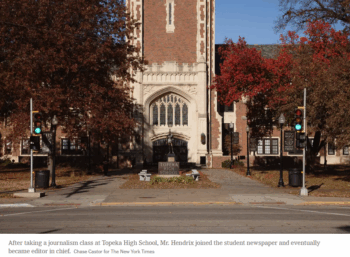
Hendrix joined his high school paper after the journalism teacher “noticed a spark,” the New York Times (11/3/25) reported.
The piece purported to be an attempt to understand how Hendrix became politicized as a far-right activist. It traced Hendrix’s life from his “precarious” childhood with a father who was a Democrat, to his deciding that when peers criticized Trump for being racist, “it all seemed like an overstatement.”
He joined the school newspaper and covered a Trump appearance in Topeka; when Trump pointed at the press pool and called them “fake news,” Hendrix was starstruck, saying, “That’s something I’ve only ever seen him do on TV, and now he’s doing it for me.”
Meeting Andrew Dwyer—then-leader of the Kansas Young Republicans, fan of white nationalist Holocaust-denier Nick Fuentes, and soon-to-be member of the infamous group chat—Hendrix said, “We got on like a house on fire.” The Times explained: “Mr. Dwyer was older and more experienced, but Mr. Hendrix said he saw a similar motivation: to stand up for working-class people.”
See, their connection is all about good intentions, not vitriol.
‘A term of endearment’
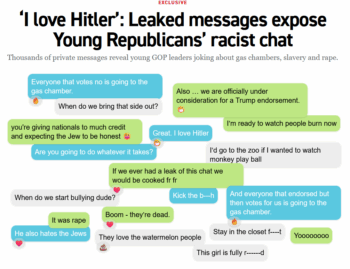
The original Politico piece (10/14/25) treated it as a story about how racism, antisemitism and misogyny in the Republican Party were revealed by a group chat leak.
In the Politico expose, Hendrix was singled out for his prolific use of the N-word in the group chat and his racial slurs: “Bro is at a chicken restaurant ordering his food,” he wrote in the chat. “Would he like some watermelon and kool aid with that?”
The Times recounted these details, and offered Hendrix’s point of view:
Looking back, Mr. Hendrix sees how his texts could be offensive. But he said he did not intend them that way. The group, he said, was firing off zingers at each other, like towel snaps in a locker room.
“We were making fun of each other,” he said. “Who can out-ridiculous who?”
This was his generation’s breaking of taboos, he said. He would never use this language with someone he did not know or did not like, he said, but saying it to a close friend feels transgressive and fun. He pointed out that the person he was insulting with the racist language was white and a friend.
Mr. Hendrix said the N-word was used all the time in his majority Black and Hispanic high school and middle school, and among video game players. A hard “er” at the end was a racist term, he argued, and his spelling—with a soft “uh” or “a” at the end—was a term of endearment.
You could possibly imagine quoting an unrepentant racist defending his use of racial slurs in this way to hold him accountable, immediately pushing back against his absurd, self-serving argument. But that’s not what the Times did. It chose next to cite two “left-leaning” organizers who work with online communities saying that “the language is much more common than people think,” and that it “can help eager-to-please members of the tribe fit in.”
‘Younger, more rebellious’
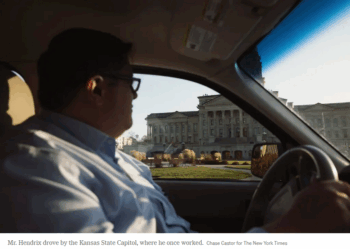
“Maybe I’ll go back to trade school,” the New York Times (11/3/25) quoted Hendrix, “and disappear into the blue-collar world and no one will ever hear from me again.”
The article finally “balanced” all these paragraphs by noting that “words have meaning, and Mr. Hendrix was leaning into something that was also quite dangerous,” pointing to a neo-Nazi reference Dwyer made in the chat. But that brief pushback concluded with Hendrix saying, “That’s not the Alex I know.”
Earlier in the piece, Tavernise and Gee called “the full picture” of the story—not just the one Hendrix himself told, and to which they devoted much of their time—”more troubling,” one in which “a younger, more rebellious generation of activists who grew up online…are bringing the language and ideas they find there into Republican activism.”
“If the language is repeated often enough, that builds a numbness to the ideas behind it, and can even help radicalize,” the Times said. It’s fairly vague and mild criticism, considering “the language” they’re talking about but don’t explicitly name is hate speech—a term not found in the 3,000-word article.
The piece described Dwyer and his extremist friends as “irreverent,” and quoted a Republican colleague saying about the white nationalist language some of his peers use: “It’s hard because some of these people mean it, and some of them don’t.” Just as a reminder, he’s talking about people who say things like “I love Hitler,” refer to Black people as monkeys, and “joke” about sending people to the gas chamber (all of which happened in the group chat).
While it gave Hendrix a largely sympathetic hearing, the Times also painted him as an outlier from his party. The article said “many” prominent Kansas Republicans were “stunned” by the leaked group chat. Several state-level Republican leaders were quoted talking about how they have worked to root out white nationalists. (As the Times failed to note, Hendrix was working for Kansas Attorney General Kris Kobach, who has been an outspoken nativist for decades.)
‘My entire life caved in’

“In person, his Midwestern manners would please anyone’s mother,” the New York Times (11/25/17) wrote in a 2017 profile of a Nazi activist.
But as for the blatant and proud bigotry coming from the very top, the Times can scarcely be bothered to scrutinize it. The only mention of any role Trump has played in the rise of bigotry in his party came about 20 paragraphs in:
It does not help that President Trump has blurred boundaries. In 2022, he dined with Nick Fuentes, the avowed racist and antisemite. And Mr. Trump recently defended the media host Tucker Carlson for his sympathetic interview with Mr. Fuentes.
One sentence also mentioned Vice President J.D. Vance’s defense of the group chat participants:
Vice President J.D. Vance, who has made a point of reaching out to young men, posted that he refused “to join the pearl clutching” about what was essentially “edgy offensive jokes” made by “kids.”
The piece ended by returning to Hendrix’s point of view:
Today, Mr. Hendrix is still trying to process what happened.
He lost a job he had loved. Prominent state Republicans denounced him. He was deluged with messages calling him a racist. His picture, one that he hated, was everywhere, including on “The Late Show With Stephen Colbert.”
“It felt like my entire life caved in,” he said.
For now, he is focused on practical things, like paying his bills. He just found a job this week, this time far from politics.
“Maybe I’ll go back to trade school,” he said, “and disappear into the blue-collar world and no one will ever hear from me again.”
He said he has no regrets. And he continues to talk with people from the chat, including Mr. Dwyer.
“While the whole world has something to say about us,” Mr. Hendrix said, “there’s at least 11 other people that I know for certain know who I am—and I know who they are.”
“And,” he added, “we’ve shared in it together.”
It’s hard to imagine Hendrix—or Trump—finding much of anything to criticize in the Times profile. In defense of its 2017 “Nazi Sympathizer Next Door” article, Times national editor Marc Lacey wrote: “What we think is indisputable…is the need to shed more light, not less, on the most extreme corners of American life and the people who inhabit them.”
There’s a significant difference between shedding light on someone you deem “extreme”—in order to hold them accountable—and simply giving them a spotlight. In its sympathetic profiles of far-right actors, the Times makes little effort to do the former, with the effect instead of simply normalizing racism and fascism.
ACTION ALERT: You can send a message to the New York Times at letters@nytimes.com or via Bluesky: @NYTimes.com. Please remember that respectful communication is the most effective. Feel free to leave a copy of your message in the comments thread here.
This post was originally published on FAIR.
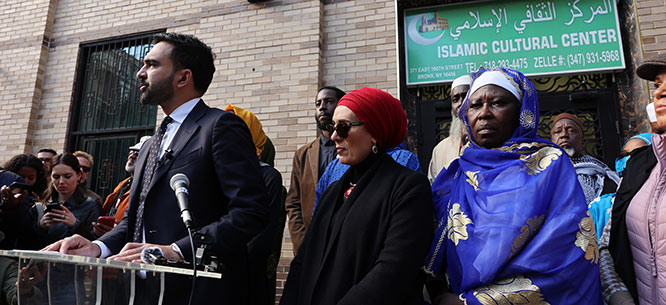










 The victims of the attack were either killed or wounded by Manchester armed police as they killed al-Shamie.
The victims of the attack were either killed or wounded by Manchester armed police as they killed al-Shamie.
